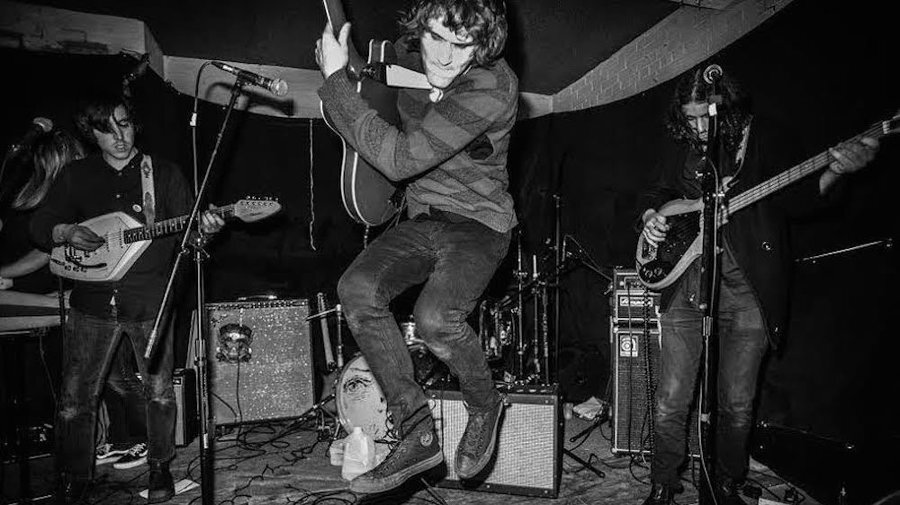The Mystery Lights Go for Raw Energy

The garage rock band's debut album is the first on Daptone Records' new rock label, Wick.
Mike Brandon and Luis “L.A.” Solano are pretty unassuming for two guys who just signed a record deal. Two weeks ago, their band The Mystery Lights released a self-titled LP, their first under celebrated independent Brooklyn soul label Daptone’s new rock imprint, Wick. Led by Brandon’s powerful, raw vocals and backed by his and Solano’s crunchy, interweaving guitars, the album is one of the best pieces of blues-based garage rock to come out in some time.
Other members have come and go over the years, but the current lineup includes Alex Q Amini on bass and Kevin Harris on organ. The drummer situation is nebulous at the moment, but during our interview, there were rumors being kicked around of a new drummer from Nashville joining the band for their current U.S. tour, which comes to The Hi-Ho Lounge Sunday night.
Part of the band’s success is undoubtedly due to their ability to poke fun at themselves. In a genre that sometimes feels like a pissing contest between guitar virtuosos and mega-hipsters, an injection of genuine youthful energy is welcome.
While they currently live in Queens, both Brandon and Solano grew up in California. These roots are as apparent in their relaxed attitudes as in their characteristic SoCal drawls. Surprisingly, though, the Cali vibe is noticeably absent from their sound. “I think we’ve always been more into the New York scene since we were younger,” says Solano. “Just reading Please Kill Me and the ‘70s punk stuff, I think that’s what had the most influence on us.”
Still, they’ve made a conscious effort to avoid the trope of the pretentious, super-serious New York band. Their video for “Follow Me Home” is a playful medley of rock clichés, from drum circles to the band’s disembodied faces singing out of sunflowers. “That was kind of our little joke about people saying that we’re a throwback band,” says Brandon. “We were going for for more of a burnout vibe than a hippie vibe, but I don’t know if anyone really got that.”
They took the video a step further, commenting on the “real New York” that everyone is so worried about losing these days (part of the reason why all of motherless Brooklyn is now moving to New Orleans). “We had our friend Ricky Powell who’s a really cool legendary ‘80s photographer from New York,” Brandon says. “He’s like an O.G. West Village dude, so…the joke was that he’s bumbed on our crew in the video and then later is cool with us.”
“You always see bands from New York really try to show New York and be real cool about it, so we thought that was a funny way to situate us here,” Solano adds.
All jokes aside, The Mystery Lights take their craft seriously. The main reason they decided to sign with Daptone was because they use live, analog recording while most of the world has switched to digital. “The way we did it at Daptone caught the raw, live energy that we were unable to catch by doing it track by track in the past,” says Brandon. “They didn’t want us to use any effects pedals really. They wanted to capture the sound on analog gear and make it sound a lot warmer. It took some work to get some of the sounds we wanted.”
“It was fun for us because we’ve done a lot of recordings on our own,” Solano says. “I think it’s a nice sound when you make mistakes using tape versus getting digital distortion, for instance. I feel like we’ve never been able to personally master digital recordings to sound as good as it sounds on tape. But I think what’s cool about working with Daptone is they were able to take our amateur attempt at making good sound out of a 4-track tape machine or an 8-track tape machine and elevate it to a pro standard that we don’t have the knowledge to do. It’s fun to work with limitations.”
The band hasn’t always had such a positive experience working with labels. “I recorded a couple demos, and they were really like more raw and a little more genuine... because it was just like in my bedroom and it was personal, and then I took it to a producer in a nice studio, and… it just lost all it’s power,” Brandon remembers. “It didn’t sound real anymore, and so I never used it. I just threw it away. It’s not worth putting something that polished out there. It doesn’t feel right.
“That’s what we love about Daptone,” he adds. “They take our demos and they do it right. And it’s not too polished but it’s clean enough to where you can like throw it out there and it’s not gonna be shrill to people’s ears, which is cool. So we’ve got a nice situation—a nice medium—with them. We didn’t know we’d ever find that.”
Clearly, staying unpolished is essential to the band’s artistic vision. “I think you can tell what the intention is sometimes, if it feels like a put-on or if it feels like someone is just making music because that’s the only way they know how to make music,” Solano says. “That’s not to say we’re against people chasing a specific aesthetic,” he adds quickly. “That’s just how we like to work, I guess.”






